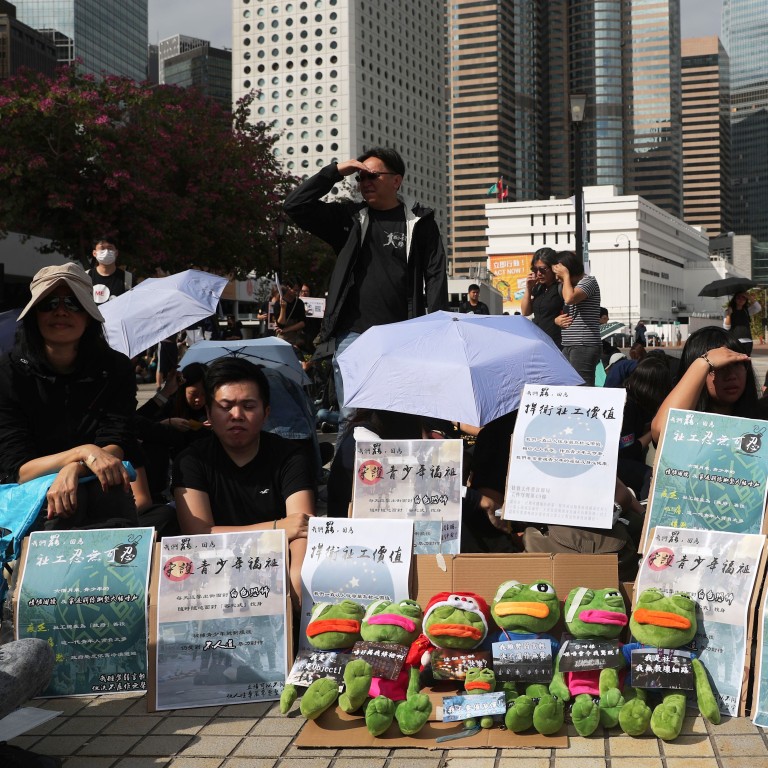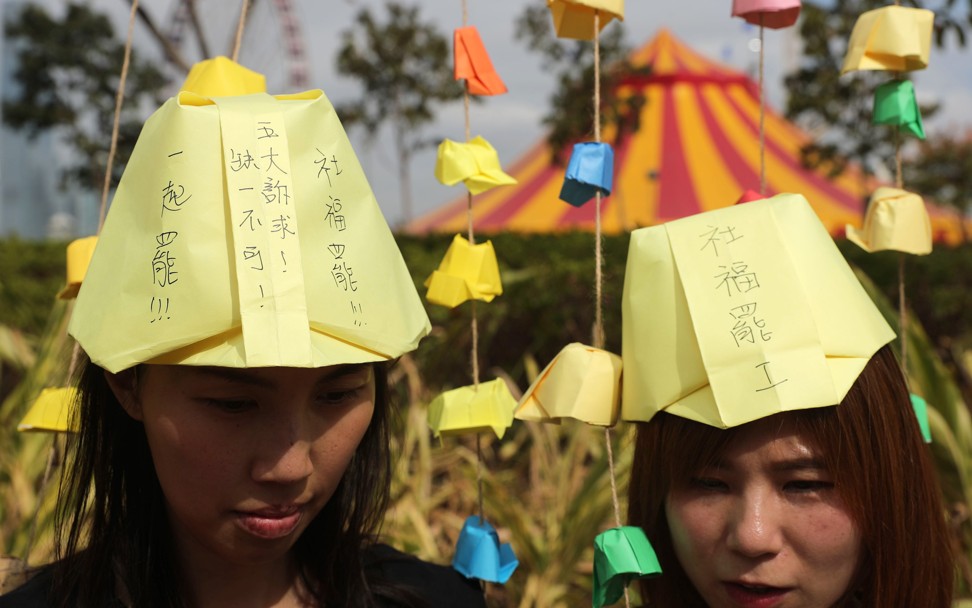
Hong Kong protests: social workers rally in Central to rouse support for three-day strike
- Activists take industrial action in bid to force Hong Kong government to meet demands of pro-democracy movement
About 200 social workers rallied in Central on Tuesday to urge Hongkongers to join a three-day strike over what they called a humanitarian crisis facing the city.
The activists gathered in Edinburgh Place in support of anti-government protesters and to condemn police’s handling of the demonstrations during six months of unrest.
A strike committee from the social welfare sector, which is made up of union members and concern groups, had organised for the industrial action to run from Tuesday to Thursday.
Patrick Lam, an occupational therapist and one of the strike’s organisers, encouraged people across different sectors to set up trade unions and hold demonstrations to hammer home protesters’ five demands, which include a judge-led inquiry into police conduct.
Hong Kong principal wants amnesty for protest-related arrests, on both sides
“The social welfare sector works for the people and we treasure the value of human beings,” Lam said.
“We really want to show the government and the world that we are very concerned about the escalating police violence and the tightening of basic personal freedoms.”
Away from the action in Central, regular lunchtime protests took place in Tsim Sha Tsui, Kowloon Bay, Kwai Chung, Sha Tin and Tai Koo, with dozens gathering in each location.
Hong Kong has been gripped since June by anti-government protests, initially triggered by the now-withdrawn extradition bill. Violent clashes have escalated between protesters and police, resulting in more than 6,000 arrests, nearly 40 per cent of which involved students.

Khalio Fung, a social worker for young people who decided to join the strike in solidarity with the city’s youth, especially those injured or arrested in the protests, said a successful strike would show that the movement had not lost momentum.
However, he said it might not be enough to force the government to deliver concrete responses to protesters’ demands.
Tsang Koon-wing, who works with poor families and new immigrants with the Caritas Social Work Services Division, said social workers must “reach out to our communities and people from all walks of life to have a political dialogue”.
Police receive 1,200 complaints over handling of Hong Kong protests
“We all have different political stances but we can all represent the demands from different socio-economic backgrounds to the government,” he added.
Before the rally, the Social Welfare Department contacted some community centres and NGOs asking how many social workers were expected to join the strike and whether day-to-day services would be affected.
Tsang, a social worker of 28 years, said that while he understood the department had to ensure basic services remained in place, he was concerned that monitoring from the government could pose a political risk for social workers.
At 1.15pm, another social worker, Tonica Wong, led those gathered at Edinburgh Place for a period of silence to unite with protesters and young people involved in violent clashes this year.
Police have repeatedly defended their response to the protests, saying they have used “minimum force” to clear protesters who have engaged in violence, vandalism and unlawful assembly.
Nearly US$128 million spent on police overtime pay since protests broke out
During the ongoing protests, hard-core elements of the movement have vandalised and started fires at railway stations and universities, while also targeting businesses with links to mainland China and setting roadblocks on major thoroughfares.
Separately, the Tung Wah Group of Hospitals, which operates 18 secondary schools, said on Tuesday that its schools had started to issue letters to parents this week reminding them to look after their children during the holidays and to prevent them from doing things which could “cause a nuisance or affect the interests of others”.
In a letter issued by one Tung Wah school, students were also urged not to “participate in illegal activities or any radical acts in uniform” during Christmas and the new year holidays, as it would “bring negative impact to themselves as well as their school”. Last month, five students from one Tung Wah secondary school were penalised after they blocked train doors to disrupt public transport amid calls for a citywide strike.

